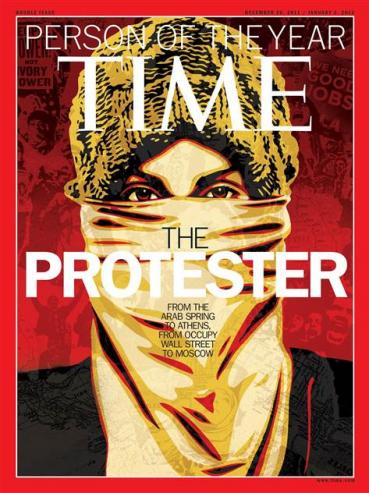Mary Anne Marrero
Mr. Hayes
Eng 100 - 1:10
3/4/13 Mr. Hayes
Eng 100 - 1:10
Word Count: 1390
Social Media and its Worth
In Watkins’ article Social Media Have Been Powerful
Tools in Organizing Egypt’s Revolution, he argues that social media has
indeed, been effective tools in systemizing the protests in Egypt. He points
out that, “While social media was not the catalyst of the Egyptian protest, it
was certainly a tool for mobilizing protest.” Although social media is not the root cause
for all these social movements that happened in Egypt, it has served as a big
help for propelling the people with power and their rights to speak freely
against the political situation. In this statement, he gives an impartial, yet
a stronger approach on the issue by considering both his point and what others
may have in mind. To further address his first point, he includes another statement
in his article by saying, “Twitter and Facebook did not start the revolution,
but they did help generations of Egyptians realize a world that not that long
ago would have been impossible to imagine.” Not to sound biased with his work
to that of the other two, Mainwaring and Sharma, but I admittedly like how he
gives out a fair concept between two opposing ideas. With these social
networking sites, people get to connect, share videos, and increase more
awareness among other people regardless of race, religion, and social beliefs.
Even though he has not witnessed the uprising nor was he part of the regime, he
assumes based on his own perspective that there is, in fact, a huge role of
social media which I find to be true as well.
 Also, Watkins adds
more effectiveness to his claim by including relevant data and evidence such as
the estimated number of Facebook accounts in Egypt, as well as relevant data
for other related social networks. He doesn’t just base his argument merely on
his own judgments; he actually seeks out for viewpoints of other people to give
out a wider outlook on the argument of whether or not social media has been an
effective tool for organizing social movements. He conducted an interview with
a man from Tahir who has witnessed the uprising. According to his findings,
“Facebook emerged as an efficient way to coordinate and organize protestors.”
This statement provided by an outside source makes his argument appear more
convincing and authentic than the others because he is not only speaking based
on his own assumption, but also from other personal mindsets on the issue which
the other two writers seemed to be lacking. Even though I question whether the
source of his evidence is credible or not, I still find it to be an additional
source that would add up to the stronger evidences for his claim. In my
opinion, I think that these protesters should take advantage from social media
because it is one way of raising awareness and for other people around the
world to reach out to them or share their insights to the condition in Egypt.
Not only do they contribute to the demand for transformation, but also lessen
the violence caused by protesting on the streets.
Also, Watkins adds
more effectiveness to his claim by including relevant data and evidence such as
the estimated number of Facebook accounts in Egypt, as well as relevant data
for other related social networks. He doesn’t just base his argument merely on
his own judgments; he actually seeks out for viewpoints of other people to give
out a wider outlook on the argument of whether or not social media has been an
effective tool for organizing social movements. He conducted an interview with
a man from Tahir who has witnessed the uprising. According to his findings,
“Facebook emerged as an efficient way to coordinate and organize protestors.”
This statement provided by an outside source makes his argument appear more
convincing and authentic than the others because he is not only speaking based
on his own assumption, but also from other personal mindsets on the issue which
the other two writers seemed to be lacking. Even though I question whether the
source of his evidence is credible or not, I still find it to be an additional
source that would add up to the stronger evidences for his claim. In my
opinion, I think that these protesters should take advantage from social media
because it is one way of raising awareness and for other people around the
world to reach out to them or share their insights to the condition in Egypt.
Not only do they contribute to the demand for transformation, but also lessen
the violence caused by protesting on the streets.
The other articles done by Mainwaring and
Sharma didn’t show much proof to effectively convince their audience. In an
article Social Media Empower People
by Simon Mainwaring, he argues that the uses of these social-network tools are
without any doubt, the fundamental part of people’s power to overthrow the
Egyptian president Hosni Mubarak. He mentions in his column that, “social media
is important because of the infinitely scalable connectivity it enables,” All
throughout his argument, he only uses one main aspect of social media to prove
why his opinion is deserves to be true and that is the “connectivity” it
enables. On the article Social Media Did
Not Cause the Egyptian Revolution, he claims that social media wasn’t the reason
behind political regime in Egypt, especially because of the lack of technological knowledge in the country. Their arguments may be tolerable however; I think that these two writers based their arguments only through their own perspective – disregarding other refutations that come along the way. Another statement in Sharma’s work which I find to be overall-biased is when he says, “a pretty substantial number of them have NEVER used the Internet and do not have email accounts. The complicated mechanisms of self-promotion and information gathering and sharing on social networks are not a part of their lives.” I find this statement on Sharma’s work to be very one-sided. He only assumes these pieces of information based on what he knows and he only limits it to that. To me, I don’t think it’s fair to say that this revolution is only limited to those living in Egypt and that it is not enough for a number of people to ignite a protest through social media and take it to next level, because the possibility of having these social movements also depends on the people regardless of the number involved. He doesn’t show effective rebuttals or even objections in his argument which makes his work the least convincing among all three columns.
behind political regime in Egypt, especially because of the lack of technological knowledge in the country. Their arguments may be tolerable however; I think that these two writers based their arguments only through their own perspective – disregarding other refutations that come along the way. Another statement in Sharma’s work which I find to be overall-biased is when he says, “a pretty substantial number of them have NEVER used the Internet and do not have email accounts. The complicated mechanisms of self-promotion and information gathering and sharing on social networks are not a part of their lives.” I find this statement on Sharma’s work to be very one-sided. He only assumes these pieces of information based on what he knows and he only limits it to that. To me, I don’t think it’s fair to say that this revolution is only limited to those living in Egypt and that it is not enough for a number of people to ignite a protest through social media and take it to next level, because the possibility of having these social movements also depends on the people regardless of the number involved. He doesn’t show effective rebuttals or even objections in his argument which makes his work the least convincing among all three columns.
Comparing the two columns to that of the most
convincing, Watkins talks about the role of Twitter in the Egyptian revolution,
how one person could take a stand, inform others about the events that were
taking place, and how Twitter served as a way for other people to follow along
and communicate. He mentions that, “a twenty-one year old woman who goes by the
Twitter name @alya1989262” created a hash tag purposely for the Egyptian
protests. Interestingly enough, Watkins was able to provide a more specific
detail as to how this social and political uprising benefited from the presence
of social media. More evidence was shown, thus making his work more unambiguous
than those of Mainwaring and Sharma’s works.
Nevertheless,
Simon Mainwaring’s claim seems capable of addressing the other refutations and
I do agree with his statement that, “social media provides a complex and deep
infrastructure perfect for the activist processes of social transformation.” However,
I don’t think he was able to come up with a more concrete reason to refute a
counter-argument, opposing his claim. He could have provided more relevant
evidence and reasons to prove his argument. Although he acknowledges the
importance of social media to the protesters, he could have done a better job
in proving his claim.
Among the three columns, Watkins’ work emerges
to be the most convincing of them all because of his effective reasoning and absolute
refutations. I think that social media does contribute to social and political
transformation. In a technologically-dependent world, we are all entitled to
these social media tools that haven’t even existed twenty years ago. Some
people would say that it isn’t effective enough as compared to campaigning and
protesting on the streets, but I think that these tools are made to improve our
ways of connecting with the world. It is one way to raise more awareness about
a nation, even to people from the other side of the world to where we stand.
Works Cited:
Sharma, Parvez. "Social Media Did Not Cause the Egyptian Revolution." The Global Impact of Social Media. Ed. Dedria Bryfonski. Detroit: Greenhaven Press, 2012. Current Controversies. Rpt. from "Egypt Is Burning, and It Is Not a Facebook or Twitter Event." Huffington Post. 2011. Gale Opposing Viewpoints In Context. Web. 7 Feb. 2013.
Watkins, S. Craig. "Social Media Have Been Powerful Tools in Organizing Egypt's Revolution." Politics and the Media. Ed. Debra A. Miller. Detroit: Greenhaven Press, 2012. Current Controversies. Rpt. from "Social Movements in the Age of Social Media: Participatory Politics in Egypt." The Young and the Digital. 2011. Gale Opposing Viewpoints In Context. Web. 8 Feb. 2013.

I always end up appreciating my own writing, even though the process of making this wore me out a little due to brainstorming, organizing, and thinking of more ideas to put. I was already anticipating the probable grade I might get on this one, but in the end, I was stunned when I got an email from Mr. Hayes that read: “A!” (not what I was expecting – ha ha ha) Before coming up with the final draft, we had to do three separate critiques for each column. In my mind, I already had a clear view of the sequence I was about to put in my paper, but I had some trouble getting stuck on jotting those ideas down on my exploratory draft. I also went to seek for advice through a one-on-one conference with an instructor at the writing center (the only appointment I had because of a busy schedule!) and having done all of that, I came up with quite a sensible outcome. I don’t think I could have done this without properly annotating and understanding the columns, referring through some chapters from Aims and doing the pre-writing stuff.
ReplyDelete